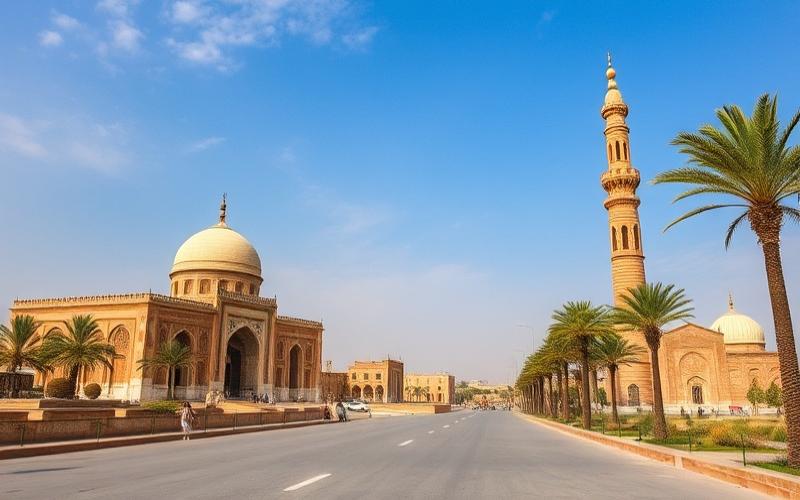
 Published on and written by Cyril Jarnias
Published on and written by Cyril Jarnias
In an economically expanding country like Bahrain, understanding the nuances of labor law is essential for the many expatriates who choose to settle there. Bahraini laws provide a structured framework aimed at ensuring worker protection, while balancing obligations for both employer and employee.
Immersing oneself in this field not only helps grasp the fundamental rights granted to expatriates but also familiarizes them with the legal responsibilities necessary for successful employment in this dynamic territory.
This article examines specific protections and obligations, highlighting the essential elements that shape the professional experience in this Gulf country.
Labor Law in Bahrain: Contracts for Expatriates
Types of Employment Contracts for Expatriates in Bahrain
| Contract Type | Duration | Primary Use | Renewal |
|---|---|---|---|
| Unlimited Term Contract | No end date | Permanent positions | Not applicable |
| Limited Term Contract | Specified (often max. 5 years) | Temporary assignments/projects | Possible by agreement |
| Temporary Contract | Short term | Replacements, peak activity periods | Possible |
| Part-time Contract | Variable | Flexibility, specific needs | Possible |
Contracts must be written in Arabic (English translation possible, but only the Arabic version prevails in case of dispute).
Legal Requirements for Employers
- Employers must sponsor the expatriate for work visa and work permit acquisition.
- The employment contract is tied to the visa: contract terms must comply with work visa requirements.
Probation Period
- Maximum of 3 months.
- During this period, the contract can be terminated without notice or compensation.
- The probation period cannot be extended beyond 3 months.
Hiring Procedure and Verifications
- Verification of candidate’s skills and qualifications, often required for work permit approval.
- Local authorities (Labour Market Regulatory Authority – LMRA) must approve the hiring.
- Mandatory medical examination for visa issuance.
Expatriate Rights Regarding Termination
- For unlimited term contracts: legal notice (generally 30 days) required from employer or employee.
- For limited term contracts: termination before term only for valid reason; otherwise compensation applies.
- Unfair dismissal: possibility of recourse through courts, with compensation claims.
- Expatriates can change employers more easily than before due to sponsorship system reforms.
Legal Recourse in Case of Dispute
- Procedure before labor courts, with priority given to the Arabic version of the contract.
- Possibility of mediation or arbitration.
- Unions are permitted but their influence remains limited.
Differences Between Expatriates and Bahraini Citizens
| Aspect | Expatriates | Bahraini Citizens |
|---|---|---|
| Visa/Work Permit | Mandatory (sponsorship) | Not required |
| Ability to Change Employers | More regulated, but more flexible than before | Free |
| Job Security | Conditional on contract/visa | Stronger |
| Access to Certain Social Rights | Restricted | Broader |
Regulated Working Conditions
- Standard working hours: 48 hours/week (8 hours/day), with one weekly rest day.
- Annual paid leave: minimum 30 days.
- Sick leave: provided by law.
- End-of-service benefit: payable upon contract expiration or termination according to legal conditions.
- Minimum wage: applicable, without discrimination.
- Protection against discrimination: gender, religion, ethnic origin.
- Housing conditions: employer must guarantee decent standards for expatriates.
- Passport retention prohibited by law.
- Unionization permitted, but with restrictions.
Key Takeaways:
All rights and obligations are strictly governed by Bahraini labor law. Compliance with these rules is monitored by authorities, and sanctions are provided for employers in case of non-compliance.
Simplified Hiring Process
- Candidate selection and verification (skills, qualifications, background).
- Contract signing (in Arabic, mandatory clauses).
- Visa and work permit application with LMRA.
- Medical examination.
- Work commencement with probation period (max. 3 months).
Good to Know:
Contracts for expatriates in Bahrain often include a fixed term with a mandatory probation period; employers must sponsor the work visa and expatriates have legal recourse in case of disputes with specific rights regarding contract termination. Skill verification and approval by local authorities are essential during hiring, with expatriates benefiting from specific conditions regarding working hours and leave compared to Bahraini citizens.
Paid Leave and Social Protections in Bahrain
Paid Leave for Expatriates in Bahrain
- Annual leave: 30 days paid leave per year after one full year of service. During the first year, leave entitlement accumulates at 2.5 days per month. Employees must take at least 6 consecutive days each year.
- Sick leave: 55 days per year distributed as follows:
- 15 days at full pay
- 20 days at half pay
- 20 days unpaid
- Marriage leave: Up to 3 paid days upon presentation of marriage certificate.
- Pilgrimage leave (for Muslims): Up to 14 paid days for Hajj, subject to at least five years of service with the employer.
Summary table of main leave types
| Leave Type | Total Duration | Compensation | Specific Conditions |
|---|---|---|---|
| Annual Leave | 30 days/year | Fully paid | After one year of service |
| Sick Leave | Up to 55 days/year | See details above | No minimum service requirement |
| Maternity Leave | Up to 75 days | See details below | Pregnant female employee |
| Paternity Leave | No official regulation | N/A | May depend on contract |
Specific Regulations Regarding Maternity and Paternity
- Maternity:
- Entitlement to 75 days, with 60 fully paid, and the last 15 unpaid.
- Legal prohibition of work during the first 40 days following childbirth.
- Upon return, two daily one-hour breaks are granted for breastfeeding for six months.
- Paternity:
- Not yet officially regulated in labor code. Some employers may grant days according to internal policy or individual contract.
Bahraini Social Security System and Application to Expatriates
The Bahraini system clearly distinguishes between nationals and expatriates:
- Bahraini nationals are mandatorily covered by the general scheme including pension, unemployment, and work accidents through social contributions (employer: 12%, employee: 7%).
- For expatriates:
- Health coverage through mandatory private insurance subscribed by employer for themselves and their families.
- Limited or no access to local unemployment or pension benefits; they generally do not benefit from public pensions or national unemployment allowances.
- End-of-service benefits mandatorily paid upon contract termination (calculation based on service duration/salary).
Social Contribution Obligations
Summary list:
- Employers must:
- Subscribe to private health insurance covering expatriates
- Pay the legal “end-of-service” benefit to dedicated fund
- Respect the legal minimum wage currently set at BHD 200/month for non-Bahrainis
- Expatriate employees must:
- Ensure their medical coverage is effective from hiring
- Do not directly pay local social contributions (except special cases)
Regional Comparison with Other GCC Countries
| Country | Minimum Annual Days for Expats | Social Security for Expats |
|---|---|---|
| Bahrain | 30 | Mandatory private insurance; contractual benefits only |
| UAE | Min. 21 | Mandatory medical insurance; no access to national pension scheme |
| Qatar | Min. 21 | Provided health insurance; little or no access to national pension |
Most neighboring states also impose private medical coverage but offer very restricted access to public social systems (unemployment/pension) for foreign workers.
Recent Legislation
As of October 2023, no major reforms have altered the fundamental structure described above; however, there is progressive strengthening of minimum wage compliance controls and gradual extension of family welfare rights (breastfeeding/maternity).
Good to Know:
In Bahrain, expatriates benefit from 30 days annual paid leave and up to 55 days sick leave, while maternity leave reaches 60 days with an unpaid extension of 15 days; social security contributions are mandatory for employers but optional for employees, unlike other Gulf countries where pension and health systems are often limited.
Understanding Minimum Wage for Expatriates
The minimum wage in Bahrain is set by law, but it varies according to employee nationality and sector. The monthly minimum wage is 400 BHD for Bahraini citizens and 200 BHD for non-Bahrainis, including expatriates, in the private sector. These amounts constitute legal floors that all employers must comply with, although specific sectors may apply different minimums through collective agreements or government decisions.
| Category | Monthly Minimum Wage (BHD) |
|---|---|
| Bahraini Citizen | 400 |
| Expatriate / Non-Bahraini | 200 |
There is no universal minimum wage applicable to all sectors or all workers; expatriates are therefore primarily governed by the private sector legal minimum, unless more favorable sectoral provisions exist.
Legal Regulations and Sectoral Variations
- Minimum wage rates are set and controlled by the government, but in the private sector, sectoral minimum wages may exist, particularly in finance or oil industry, often through collective agreements.
- Employers must pay at least the legal minimum wage, but expatriates frequently receive additional allowances (housing, transportation, education, annual air ticket) added to base salary.
Employer Obligations and Wage Controls
- Obligation to respect the applicable minimum wage for each staff category.
- Employment contracts must explicitly state salary and benefits to ensure transparency for expatriates.
- Labor authorities conduct regular checks and may impose sanctions for non-compliance.
Wage Review Mechanisms
- Minimum wages are periodically reviewed by the government based on economic conditions and reports on wage evolution across different sectors.
- Dynamic sectors (finance, IT, oil) may offer salaries well above the legal minimum.
Protections and Recourse for Expatriates
- Expatriates are protected against exploitation through contractual obligation to state salary and benefits.
- In case of minimum wage non-compliance, expatriates can approach labor authorities or initiate legal proceedings.
- Employers are also required to pay an end-of-service benefit upon contract termination, proportional to employment duration and last received salary.
Concrete Example:
An expatriate worker in construction sector, paid 210 BHD/month, additionally receives housing allowance of 50 BHD and annual air ticket. In case of salary payment dispute, they can approach the Ministry of Labor, which has a dedicated unit for mediation and employer monitoring.
Challenges and Opportunities:
Challenges:
- Understanding treatment differences based on nationality and sector.
- Uneven application of minimum wage in some unstructured sectors.
- Difficulty asserting rights for poorly informed or employer-dependent expatriates.
Opportunities:
- Allowance and benefit systems that can significantly improve overall compensation.
- Accessible mediation tools and recourse for expatriates in case of non-compliance.
- Ongoing debate about establishing universal minimum wage, which could strengthen protection for all workers.
Key Takeaways:
The minimum wage in Bahrain differs by nationality and sector, but expatriates have a legal minimum and contractual protections. Employers are subject to regular controls and expatriates have access to recourse in case of non-compliance, although disparities persist across sectors and worker awareness levels.
Good to Know:
In Bahrain, there is no specific minimum wage for expatriate workers, and wages often vary by sector; employers must ensure contract compliance at risk of legal sanctions, with recourse available for expatriates in case of agreement non-compliance.
Disclaimer: The information provided on this website is for informational purposes only and does not constitute financial, legal, or professional advice. We encourage you to consult qualified experts before making any investment, real estate, or expatriation decisions. Although we strive to maintain up-to-date and accurate information, we do not guarantee the completeness, accuracy, or timeliness of the proposed content. As investment and expatriation involve risks, we disclaim any liability for potential losses or damages arising from the use of this site. Your use of this site confirms your acceptance of these terms and your understanding of the associated risks.





























































